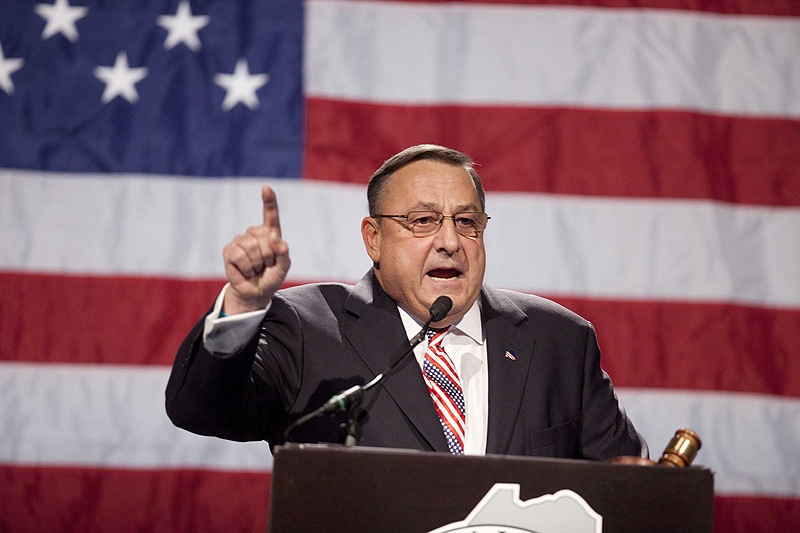AUGUSTA – Three months after Republican Paul LePage became Maine’s governor in 2011, he signed a law adopting the Common Core standards to better prepare students for college or careers.
Since then, the program to which he gave his imprimatur has become the focus of tea party anger. While LePage isn’t stopping implementation of the standards, he now disavows them.
“I don’t believe in Common Core,” LePage said in a recent interview. “I believe in raising the standards in education.”
LePage’s contortions reflect the politicization of Common Core benchmarks, developed to regularize and improve education across the nation. After 46 states adopted and are implementing the standards in math and language arts, some are balking amid concerns that the federal government may be taking over.
Indiana, Michigan, North Carolina, Oklahoma, Pennsylvania and Wisconsin this year halted or delayed implementation, according to the Denver-based National Conference of State Legislatures.
Republicans control the governor’s office and the legislature in all of those places. Twenty-six bills across 11 states related to Common Core are pending, the NCSL said.
REFERENDUM QUESTION
In Maine, Common Core opponents say they will collect the 57,277 signatures needed to put a referendum on the November 2014 ballot. Debate about benchmarks and testing “will continue to be a big conversation” throughout the nation, said Michelle Exstrom, education program director at the NCSL.
Common Core’s standards for kindergarten through high school were finalized in June 2010 by the National Governors Association Center for Best Practices and the Council of Chief State School Officers, according to corestandards.org. Only Alaska, Nebraska, Texas and Virginia didn’t approve them, the NCSL said.
They were a response to U.S. graduates falling behind those in other countries. The nation ranked 14th among 37 countries in the percentage of 25- to 34-year-olds with higher education after being a world leader a generation ago, according to a 2012 report by the Paris-based Organization for Economic Cooperation and Development. Only 39 percent of 2013 high-school graduates who took the ACT standardized test met three or more of four college-readiness benchmarks, and 31 percent met none, ACT Inc., a non-profit based in Iowa City, Iowa, said in an Aug. 21 statement.
Opposition to Common Core increased this year after commentators Glenn Beck and Michelle Malkin criticized it and the Republican National Committee adopted a resolution April 12 opposing it as “a nationwide straitjacket.” Malkin described it on her blog as “the stealthy federal takeover of school curriculum and standards.”
The federal government offered states financial incentives to adopt the standards and helped fund the two consortiums that created national tests, said Michael Petrilli, executive vice president of the Thomas B. Fordham Institute, a Washington education-policy group that promotes “standards-based reforms.”
Even so, the common standards are better than what most states had, he said.
“There are legitimate reasons to worry about federal overreach, and it’s certainly true that the federal government has been involved with the Common Core,” Petrilli said. “For me, those concerns are outweighed by all the positives.”
The benchmarks are not as rigorous as they should be, will cost too much to implement, and states shouldn’t adopt “one- size-fits all” guidelines, said Jim Stergios, executive director of the Pioneer Institute, a Boston-based research group that promotes limited government.
“For some states, it’s a step up,” Stergios said. “For some states, it’s a wash. And for some states, it’s a step down. It’s codifying mediocre standards across the country.”
LIBERAL OPPOSITION
Not all opposition is from the right. Some liberals oppose what they see as excessive testing, said Mark Naison, a professor of African-American studies and history at Fordham University in New York.
Naison, who calls himself a leftist, co-founded a Facebook group in June he called the “Badass Teacher Association” opposed to the Common Core. It has 26,000 members, he said. More people will question the standards once they see the results, he said.
“The political alignments here are going to shift,” Naison said.
In Maine, LePage’s Department of Education announced the adoption of the Common Core in 2011 with a release saying the standards “do not tell teachers how to teach” while “allowing schools and teachers to plan their curriculum.”
Opponents say the opposite.
“This is a historic transition of our education system,” said Erick Bennett, a political operative who helped LePage win his first term and is spearheading an effort to collect the signatures needed for the referendum to nullify the standards. “The local school boards no longer have control over our schools.”
‘THIS WAS CALLED COMMUNISM’
Sitting in an Irish pub drinking beers last week in Bath, Gordon Draper, 61, and Dan McKenna, 53, said they oppose the standards. Draper said he has custody of his 9-year-old grandson and is pulling him out of public school, and McKenna plans to collect signatures for repeal.
“It reminds me of the Soviet Union,” McKenna said in an interview. “When I was in school, this was called communism.”
Still, some Republican lawmakers in Maine are standing by the program. Common Core engenders critical thinking that workers need, said state Sen. Andre E. Cushing III.
“Businesses are frustrated with the skill level of employees they are hiring,” said Cushing, 54, of Hampden.
Copy the Story Link
Send questions/comments to the editors.



Success. Please wait for the page to reload. If the page does not reload within 5 seconds, please refresh the page.
Enter your email and password to access comments.
Hi, to comment on stories you must . This profile is in addition to your subscription and website login.
Already have a commenting profile? .
Invalid username/password.
Please check your email to confirm and complete your registration.
Only subscribers are eligible to post comments. Please subscribe or login first for digital access. Here’s why.
Use the form below to reset your password. When you've submitted your account email, we will send an email with a reset code.